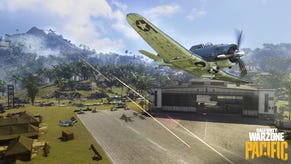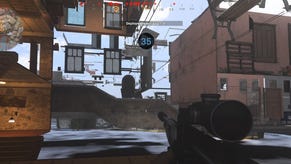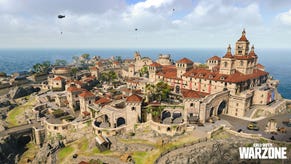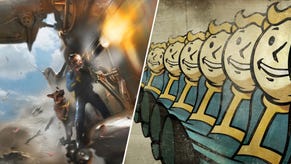Call of Duty: Warzone Directors On Its Runaway Success, And What's Next: "I Won't Pretend It's Easy"
The directors of Call of Duty: Warzone on the arguments over the Gulag, dealing with cheaters, and what comes next.
This article first appeared on USgamer, a partner publication of VG247. Some content, such as this article, has been migrated to VG247 for posterity after USgamer's closure - but it has not been edited or further vetted by the VG247 team.
At an event before the launch of Call of Duty: Modern Warfare, Infinity Ward multiplayer design director Geoffrey Smith flipped a question on me. With the addition of large-scale Ground War maps, I asked if they were entertaining the potential of a battle royale. Smith asked if I would even be interested in such a thing. I was honest and said not really, given how quickly I fell off Call of Duty: Black Ops 4's Blackout. Oh, how silly I was.
Like 60 million other people during the COVID-19 pandemic, I've looked to Call of Duty's latest battle royale offering, Warzone, as a means to facilitate daily hangouts with friends. It's not the first free-to-play Call of Duty—last year saw the release of Call of Duty: Mobile—but it is the first major, free-to-play console experience for the series. Warzone launched in March 2020. Since then, it has quickly become one of the most-played battle royale games in the world.
"[W]e were always looking for ways to bring more fans into Call of Duty," says Joe Cecot, multiplayer director and design director at Infinity Ward. Cecot is more on the "tech side" of the multiplayer team, while Smith tells me he's on the "creative" side. "So we really wanted to try like a big free-to-play experience to see what that would do for us and see if we could get new people to come in and try, and that's actually been really successful for us. Like even with the launch of Warzone, we've had a lot of people come in, try, and then hop over to multiplayer and, you know, pick up the Modern Warfare package. So that was definitely one of our motivators."
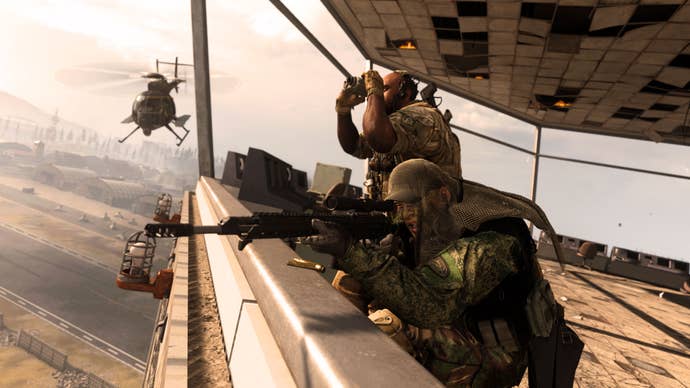
Call of Duty has always performed well for its core audience, but apparently, that audience has shrunk over the years. In the 2010s, Call of Duty dominated the top 20 best-selling games of the decade. Call of Duty: Black Ops from Treyarch is the franchise best-seller; it charted just under Grand Theft Auto 5 as the second best-selling game of the decade. Infinity Ward's own Modern Warfare 3 took the fourth spot, and the newest Modern Warfare, released at the tail end of 2019, landed at number 12. Entering the free-to-play market was its attempt to win some players back. In Warzone, that resulted in a battle royale that was at once faithful to the genre and took calculated risks. Risks that were actually controversial internally.
So, What is a Battle Royale, Anyway?
Pretty much anything unique about Warzone was debated during development. The dense, urban environments of Warzone's map, Verdansk, split the staff, with many preferring the more sparse landscape typical of the battle royale genre. Health regeneration, where a player can still recover full health if they duck out of action for a moment (while armor still needs to be re-equipped when shot down), also "went over weird," according to Smith.
Chief among the points of discussion was the Gulag: the 1v1 prison cell match wherein after players fall in battle, they have a chance to re-enter the match alongside their team if they emerge from the Gulag victorious. It's Modern Warfare's 2v2 Gunfight, made slimmer. Winning a Gulag match is often a celebratory action, but losing a Gulag match is not the end, as teammates can always buy a player back with money they've looted across the map.
"The Gulag was something that was really contentious during development. There were some players who loved it. Some players who felt like it kind of removed the purity of battle royale," says Cecot.
The "purity" of battle royale, in general, was a disputed notion within development, just as it is in any conversation about the merits of the genre. But despite being a new idea for battle royales, it manages to capture the important vibe of the genre in its thrilling, ultimately fair fight. It helps rectify the sour experience of being shot unexpectedly—because you know there's potential for a comeback waiting just on the other end of a Gulag encounter. "You have that similar battle royale experience where it's this or nothing; like I'm either back back or I'm out."
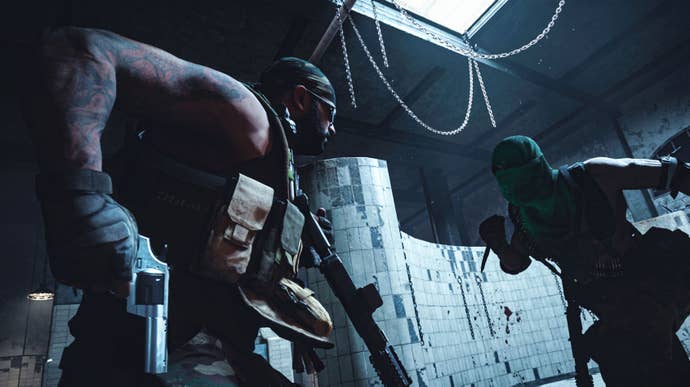
While there may have been differing internal interpretations of what it means to be a battle royale, the directors stuck to their own vision of pushing "player stories" and a big sandbox. Whenever an idea had pushback, they'd go back to core questions—is this hurting the game? Is it increasing the sandbox elements? Does it encourage action?—rather than whether it was fulfilling the promise of what a battle royale should be.
Warzone isn't Call of Duty's first rodeo with the battle royale genre. Call of Duty: Black Ops 4 had Blackout, a battle royale that steered more toward the slower PUBG-side of things, rather than Fortnite's frenetic, action-heavy style. It also lacked Warzone's free-to-play model. Players had to buy Black Ops 4 to get access to Blackout.
"I took a couple key pieces of information away [from Blackout]," says Amos Hodge, Creative Director at Raven Software, who co-developed Warzone and Modern Warfare with Infinity Ward. "The first was respawning. As Blackout added more modes and played with respawning, it became more popular. It kept players in the game longer, more engaged. So that was one aspect we wanted to make sure that we had from beginning, respawning."
Another was the fractured progression of Black Ops 4, and other Call of Duty games for that matter, wherein experience was sanctioned individually from Zombies to multiplayer. One's "progression journey," as Hodge phrases it, didn't continue into Blackout. They started from scratch. In Modern Warfare, the opposite is true. Progression (and the feel of weapons) translates evenly between all the modes. There's just one battle pass shared across Modern Warfare, including Warzone.
The goal, ultimately, was to fundamentally change as little as possible about how Modern Warfare played for Warzone, which was tricky with the addition of new aspects like armor and, obviously, longer bullet travel compared to the smaller maps in base multiplayer. As Cecot puts it, it's a greater design challenge to "get a player to run for, I guess, 10 seconds versus trying to get a player to run for minutes or find a vehicle and go to a place."
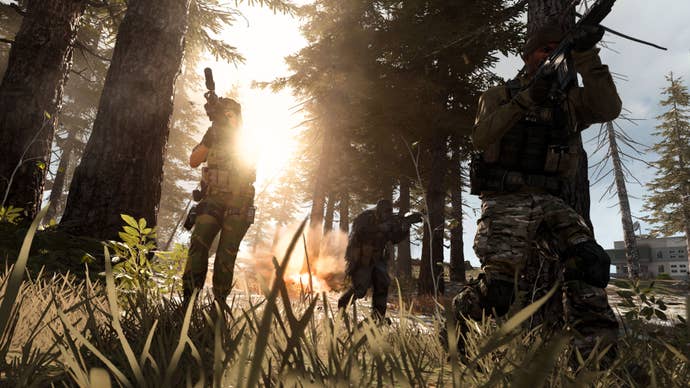
Balancing Two At Once
For players who already own Call of Duty: Modern Warfare, Warzone is just another slot on the main menu. It's quite a hefty one too—currently, the group package is nearing 200GB on consoles alone, and more is suggested for PC on account of shaders. In a follow-up question, Production Director Paul Haile at Infinity Ward affirmed the developer is aware of the alarming rate the games are growing with each patch. A patch at the end of April alone was 15GB.
"Modern Warfare and Warzone are both massive experiences with tons of ways to play and new content being added regularly, and we are cognizant of the overall download size," Haile writes over email. "As a team we are committed to updating the game with new free content of course, but have also taken steps for overall footprint management, including a DLC pack management screen for console users. This allows players to pick and choose which DLC packs they want to keep, and remove the others to recover more space."
Meanwhile, for players of just the standalone version of Call of Duty: Warzone, the other Modern Warfare modes are a purchase (and large install) away. But Infinity Ward didn't want players to ever feel like they were missing out.
"One of the really interesting challenges for us [...] was: How do we pair Modern Warfare with the free-to-play offering and not cannibalize each other and make sure that free to play players feel like they're getting a full experience," says Cecot. "[W]e talked about everything from like, 'oh, they get a lower XP rate,' or 'they don't level up as high,' but we really put a focus on making sure that free-to-play players didn't feel like second class citizens. That they had a really solid experience, and there was a really clear delineation. You have the progression, you have the soldiers, you have the unlocked operators, and you have the Warzone map. And then on the other side is Modern Warfare."
The two are considered different titles by the studios. One, free-to-play; the other, a fully-featured $60 product. "[It's] no small amount of work," says Smith with a laugh, about maintaining Warzone alongside the rest of Modern Warfare. "Every time we layer on a new piece, we're like, 'Oh! There's more things we have to maintain,'" adds Cecot.
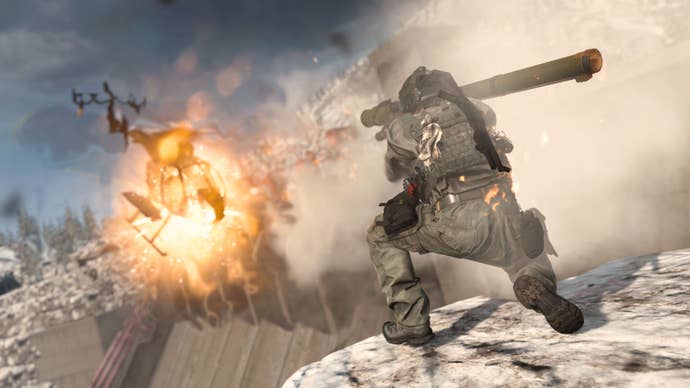
Production of the ongoing development for both Warzone and Modern Warfare has also had a big change: a battle pass. While Treyarch's Black Ops 4 also flirted with a battle pass, which was pioneered by Fortnite and has now trickled into virtually every online game currently out there, Modern Warfare committed. Maps are no longer locked behind a paid season pass. It released Warzone for free post-launch. The battle pass system, where new "seasons" introduce a new battle pass and additional content, has changed up Call of Duty's ongoing development dramatically. As Hodge puts it succinctly: "you're always behind."
"You're always on production for the next thing, the next thing, the next thing. You're sort of on this treadmill of content that's continuously streaming versus the previous way we did it, where it was just like it was chunks of a pack of three maps and some bonus content all grouped together," says Hodge. "It's just been a different shift in working than what people are used to as an organization because Activision really hasn't done a battle pass-type thing [before]. [...] It's been a different process."
Playtesting for Warzone in general has been a mighty challenge. There's a big difference, after all, testing out a traditional 6v6 match compared to a 150-player match in a dramatically larger map. Cecot says even spread out between Infinity Ward, Raven Software, fellow support studio Beenox, and a QA team in Minnesota, wrangling it all at any given point has been a significant, but expected, challenge. "[E]ven for just us as directors playing modes and giving feedback, you're trying to do multiplayer feedback and Warzone feedback, simultaneously worry about maps at the same time," says Hodge. "So it's just double the load on everybody. QA in particular has done a great job; they were probably hit the hardest."
And now there's the pandemic.
One day in March, everyone at Infinity Ward and Raven Software, like others across the world, packed up their work PCs and went home for an uncertain amount of time. The recent transition to a work-from-home setup across the Call of Duty studios has thrown an addition wrench in the complicated ongoing development of both Warzone and Modern Warfare. Playtesting, development, meetings-it's all been thrown into disarray. Cecot talks about how short face-to-face conversations are now over Slack, or on web video. He credits their IT department for being extra supportive during the technologically difficult time. And it all happened in the midst of Warzone's debut window. "I won't pretend it's easy," he says.
Hodge, who's at Raven Software rather than Infinity Ward like Cecot and Smith, says there's been both positives and negatives in the transition. The negative is the breakdown of communication in general, especially when it comes to getting verbal, freeform feedback post-playtesting sessions. The positive is that during playtesting, which Hodge describes as once being a sort of couch co-op experience that now has to be done remote, has led to the teams further considering another aspect surrounding Warzone.
"It's allowed us to focus more on social elements, what kind of social elements can we bring to the game because we're not all together anymore," says Hodge. "We're not shoulder to shoulder; we're all at home by ourselves playing the game. That sort of has a different experience and allows us to attack problems from a different angle that we really didn't do before. So I think that has really kind of helped us shift some of our priorities to more kind of social thinking."
What's Next for Warzone
Warzone ran afoul of a common issue in modern multiplayer shooters: cheaters. Like Call of Duty: Modern Warfare proper, Warzone's has full cross-play functionality, which is great for partying up with players across PlayStation 4, Xbox One, and PC. Cheaters, typically, take advantage of the PC version, and with cross-play, it means everyone's encountering them. The directors are hesitant to share precisely what they're doing to combat the issue-after all, that'd be giving info to the folks taking advantage in the first place-but says the pervasive issue remains at the forefront of their ongoing concerns.
"It is something that's really high on our list," says Cecot. "We have a team at Activision that's dedicated to it and finding those people, but it's an arms race."
Warzone recently implemented a new requirement for two-factor authorization for new PC accounts. Players can report what they suspect is cheating in-game too, which helps the studios identify the sources of the issue, but it can only go so far. It's unfortunately a never-ending battle, just as it has been for other shooters.
With the frequent updates have been other unintended consequences. One update bugged out in-game chat for at least a week, where the chat would drop out unpredictably, or sometimes have no issues at all. Other bugs were seen more as useful exploits, such as the recent nerf of the Snake Shot and Akimbo-outfitted .357 pistol. These particular dual pistols were uber powerful–the likes of Twitter and the Warzone subreddit were full of impressive plays with them for weeks. It was nerfed recently, to the dismay of fans.
"The Snake Shot issue was actually a bug in Warzone," says Cecot. "Basically, [it] stopped the fall off of damage a little bit early and it was being treated as a pistol, not as a shotgun, essentially. So it was a fun bug that was caught a bit late, but it's definitely been interesting to keep the two things [Warzone and standard multiplayer] balanced."
As for content changes, Smith talks of small-scale, quality of life changes for the map. Hodge says they're leaning into some of the more sandbox elements of Warzone–like how he's seen folks throw C4s onto vehicles as they jump out of them–when brainstorming what other sorts of interactions they can encourage next. Cecot says they're always planning far, far in advance, such as ongoing development of the next season.
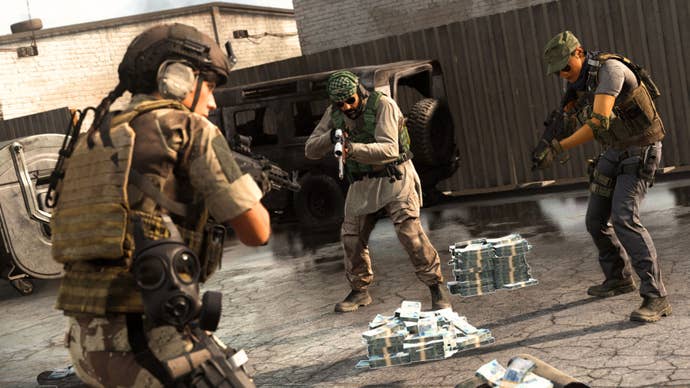
Warzone isn't all just battle royale. It has Plunder too, the pure-sandbox mode with endless respawning, where the main goal is just to get as much money as possible. "I think we're going to continue that tradition, and we're developing modes that are outside the battle royale realm, just like Plunder is," says Hodge. "We're going to push things, so like Plunder, we're going to head in different directions that aren't battle royale because Warzone, to us, is more than battle royale. It's just a large map combat scale, and we're thinking, where can we take that next? So it's definitely larger than battle royale."
Call of Duty games are annualized, meaning that typically, their lifespan doesn't stretch much longer than a calendar year. Call of Duty entries have 12 months to subsist, and six months into that Activision usually moves on to marketing the next big game. The release of Call of Duty: Warzone signals something different though: if Warzone is to compete with the likes of Fortnite and Apex Legends, other free-to-play battle royales, it has to look ahead beyond just the debut calendar year.
And from the sounds of it, the directors are hoping the one-year-only curse doesn't befall Warzone. It being free-to-play itself is like a direct defiance to the usual fate. "That's the plan," says Hodge when I ask about the hopefully-longer-than-usual lifespan for Warzone.
"As long as it's popular, we're going to keep updating it," adds Cecot. "We're gonna keep pushing it and figuring out how it fits in the future."
With 60 million downloads in just over two months of release, it's probably safe to say it will stay popular for some time.
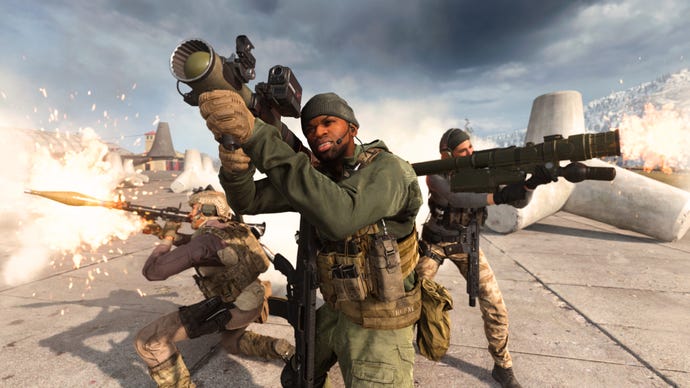


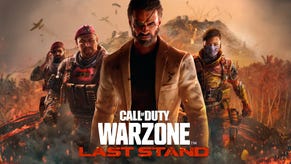
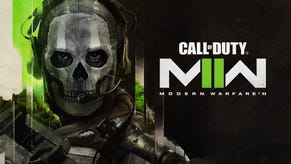
.jpg?width=291&height=164&fit=crop&quality=80&format=jpg&auto=webp)

